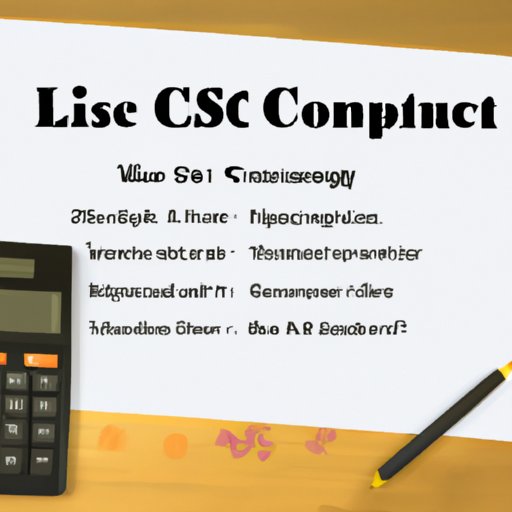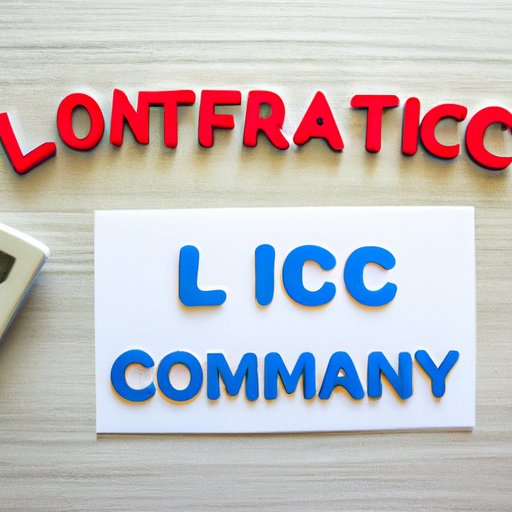Introduction
A limited liability company (LLC) is a popular business structure that provides personal asset protection and tax advantages. While forming an LLC is relatively simple, there are certain costs associated with it. This article will provide an in-depth look at the costs of forming and maintaining an LLC, as well as the factors that can impact those costs.

A Comprehensive Guide to LLC Costs
When it comes to LLC formation costs, there are three main categories: forming an LLC, ongoing fees and expenses, and professional services. Let’s take a closer look at each.
Forming an LLC
Forming an LLC requires some upfront costs. These include filing fees, registered agent service, and the creation of an operating agreement. Additionally, depending on the state you are forming your LLC in, there may be additional fees or paperwork required.
Annual Fees and Ongoing Costs
Once your LLC is formed, there are a few annual fees and ongoing costs to consider. These include state filing fees, annual report fees, and any applicable business license or permit fees. Additionally, depending on the type of business you’re running, there may be other fees or taxes associated with it.
Professional Services
While it is possible to form an LLC yourself, it is often beneficial to hire a professional to help with the process. Professional services such as legal advice, accounting assistance, and tax preparation can all add to the cost of forming an LLC. Additionally, if you plan to pursue venture capital funding or other investments, you may need to hire additional professionals.
Breaking Down the Cost of Forming an LLC
Let’s take a closer look at the individual components that make up the cost of forming an LLC.
Filing Fee
The first cost associated with forming an LLC is the filing fee. This fee varies from state to state, but typically ranges from $50 to $500. The exact fee depends on the state you are filing in and the type of LLC you are forming.
Registered Agent Service
Another cost associated with forming an LLC is the registered agent service. This service ensures that all legal documents and notices are received and responded to in a timely manner. The cost of this service varies, but typically ranges from $50 to $200 per year.
Operating Agreement
An operating agreement is a document that outlines the ownership and management structure of your LLC. It also defines the rights and responsibilities of members, managers, and any other parties involved in the business. The cost of creating an operating agreement varies, but typically ranges from $50 to $500.
Other Costs
In addition to the filing fee, registered agent service, and operating agreement, there may be other costs associated with forming an LLC. For example, some states require a publication requirement, which can add to the cost. Additionally, depending on the type of business you are running, there may be additional fees or paperwork required.
What Fees Should You Expect When Setting up an LLC?
When setting up an LLC, there are a few key fees to be aware of. Let’s take a closer look at each one.
State Filing Fee
The state filing fee is the most significant cost associated with forming an LLC. This fee varies from state to state, but typically ranges from $50 to $500. The exact fee depends on the state you are filing in and the type of LLC you are forming.
Registered Agent Fee
The registered agent fee is another cost associated with forming an LLC. This fee is typically around $50 to $200 per year and covers the cost of the registered agent service. This service ensures that all legal documents and notices are received and responded to in a timely manner.
Operating Agreement
An operating agreement is a document that outlines the ownership and management structure of your LLC. The cost of creating an operating agreement varies, but typically ranges from $50 to $500.
Business License/Permit Fees
Depending on the type of business you are running, there may be additional fees or paperwork required. This can include business licenses, permits, or other regulatory requirements. The exact fees vary by state and type of business.
Other Potential Fees
In addition to the filing fee, registered agent service, and operating agreement, there may be other costs associated with forming an LLC. For example, some states require a publication requirement, which can add to the cost. Additionally, depending on the type of business you are running, there may be additional fees or paperwork required.

How to Estimate the Cost of Forming an LLC
Estimating the cost of forming an LLC is fairly straightforward. First, research the state requirements for forming an LLC in the desired state. This will give you an idea of the filing fee and any additional paperwork or fees that may be required. Next, calculate the filing fee and the cost of any additional services you may require. Finally, research professional services such as legal advice, accounting assistance, and tax preparation.
Factors That Impact the Cost of Forming an LLC
There are a few factors that can impact the cost of forming an LLC. These include location, type of business, and number of owners.
Location
The state you choose to form your LLC in can have a big impact on the cost of formation. The filing fee varies from state to state, so it’s important to research the requirements of the desired state before starting the formation process.
Type of Business
The type of business you are running can also impact the cost of formation. Certain businesses may require additional paperwork or fees, such as business licenses or permits.
Number of Owners
The number of owners in an LLC can also affect the cost of formation. In some states, the filing fee may be higher for LLCs with more than one owner.

The Pros and Cons of Starting an LLC
Before deciding whether to form an LLC, it’s important to weigh the pros and cons. Here are a few of the key benefits and drawbacks of starting an LLC.
Pros
One of the biggest benefits of forming an LLC is the personal asset protection it provides. LLCs also provide tax advantages and can simplify the management structure of a business. Additionally, forming an LLC is relatively simple and straightforward.
Cons
One of the drawbacks of forming an LLC is the cost. There are several fees associated with forming and maintaining an LLC, and these can add up quickly. Additionally, LLCs are not suitable for all types of businesses, and some may require a different business structure.
Comparing the Cost of LLC Formation to Other Business Structures
It’s important to compare the cost of forming an LLC to other business structures, such as sole proprietorships, partnerships, and corporations. The cost of forming an LLC is typically lower than the cost of forming a corporation, but higher than the cost of forming a sole proprietorship or partnership.
Sole Proprietorship
A sole proprietorship is the simplest and least expensive business structure. It requires no formal paperwork and typically has no filing fees or other costs associated with it.
Partnership
A partnership is slightly more complex than a sole proprietorship, but still relatively inexpensive. A partnership typically requires the filing of a partnership agreement, but there are usually no filing fees or other costs associated with it.
Corporation
A corporation is the most complex and expensive business structure. It requires the filing of articles of incorporation and the payment of filing fees and other costs. Additionally, corporations are subject to ongoing fees and other costs associated with maintaining the business.
Conclusion
Forming an LLC is an important step for many entrepreneurs. This article provided a comprehensive guide to the costs associated with forming and maintaining a limited liability company. The cost of forming an LLC varies depending on the state you are forming in, the type of business you are running, and the number of owners. Additionally, it’s important to compare the cost of forming an LLC to other business structures, such as sole proprietorships, partnerships, and corporations. With the right preparation and research, forming an LLC can be a relatively straightforward and cost-effective process.
(Note: Is this article not meeting your expectations? Do you have knowledge or insights to share? Unlock new opportunities and expand your reach by joining our authors team. Click Registration to join us and share your expertise with our readers.)
